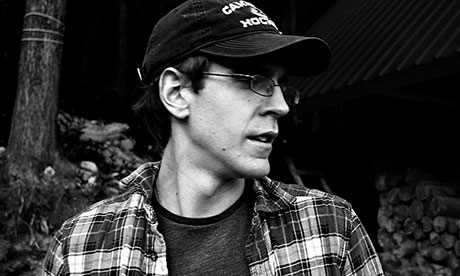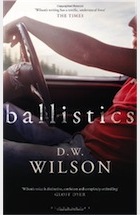The novelist and short-story writer DW Wilson … haunted by tales of distant dads
In my first novel, Ballistics, a young man searches for his estranged father at the behest of his dying grandad. Wildfires blaze through the Canadian Rockies, and it is into this furnace that Alan West, the protagonist, must venture. It's a story of families, betrayal and one young man's attempt to right past wrongs.
I should put my cards on the table: I do not have an absent father. My old man and I get along as well as any dad and son separated by an ocean and the better part of a continent. He's a sergeant in the Royal Canadian Mounted Police and he recently showed up for my wedding in full ceremonial garb: red serge, stiff-brimmed stetson, riding boots and spurs, his marksman badge and medals a-jingle on his breast. He cut an impressive figure.
What follows is my list of 10 admirable absent fathers in fiction. In some cases, the narrators themselves are the absent dads; in others, the narrator is the abandoned child. And on occasion, an absent dad serves as little more than a technicality by which I can draw your attention to a book of great worth.
1. Jerry Bines in For Those Who Hunt the Wounded
Down by David Adams Richards
Jerry Bines is a recovering/relapsing alcoholic, prone to violence,
borderline illiterate, but possessed of a great heart. By the end of this book,
we are presented with two very different views of him: first, that he "was
trying to save everyone"; second, that he "would use you whenever he
could". Whichever you subscribe to, this is a haunting tale. Having been
acquitted of murder, Jerry returns to his tiny home town in New Brunswick in a
last-ditch and probably futile bid for redemption.
At the opening of Y, a young mother abandons her daughter on the steps
of a YMCA. Shannon's birth-father is an at once lovable and despicable man,
whose drug habits lead to Shannon's abandonment and, by extension, her search
for the people who abandoned her. Celona is a master sentence-crafter, a lover
of detail, rhythm and voice; Y shouldn't be missed.
3. Tom Bauer's absent father in Contact Sports,
from Traplines by Eden Robinson
He is never mentioned, but the absence of Tom's dad in the novella
Contact Sports is what enables Jeremy, Tom's dishonourably discharged older
cousin, to assume a twisted version of the father-figure role. Tom is more or
less a good teenager, into the recreational use of drugs and liquor, a fan of
baggy clothes and girls who are out of his reach. Jeremy is something else –
sadistic, a man in love with power – and he uses his dubiously acquired money
to pay the rent and bills that Tom's mother can't. The catch: Tom must do
whatever Jeremy wants, until he deems the debt repaid. And from here, there
aren't many places that Tom's life can go but down.
4. Annie and Suzanne Bird's missing father in
Through Black Spruce by Joseph Boyden
He's rarely mentioned, but his absence provides the space for one of the
novel's two narrators, Will Bird, to take up the father-figure slack – though
Will himself can't exactly claim a flawless record when it comes to loyalty
and family. Set in northern Ontario, this book traces, simultaneously, a
young woman's search for her missing sister and an ageing man's
multi-generational feud.
5. Cal O'Mara in February by Lisa Moore
Based around the 1982 sinking of the Ocean Ranger oil rig, February
tells the story of Helen O'Mara, who loses her husband, Cal, in the wreckage.
This is a tale of suffering and dignity, but also an examination of love in its
many, often painful, forms. Cal himself is a paradigm as father and husband,
but terrified of water. His death at sea transfers that fear to his eldest son,
who makes his living as a safety adviser for the very same rigs.
6. Eleanor Dew's deceased father in Late Nights on
Air by Elizabeth Hay
Yellowknife, 1975. Against the backdrop of environmental and cultural
controversy, this novel follows a cast of northern radio jockeys trying to
carve a niche for themselves during the rise of TV. Among the principal
characters is Eleanor Dew, a woman whose father died when she was young and who
has spent a lifetime in loneliness, too afraid or too unable to find similar
comfort in a companion.
7. Jerry Potts in The Last Crossing by Guy
Vanderhaeghe
More legend than fictional creation, Jerry Potts is a half-Blackfoot,
half-Scottish guide for a pair of rich Englishmen, Charles and Addington Gaunt,
who traverse the Canadian frontier in search of their missing brother. Potts
has a son with a woman from a rival tribe and will risk death to see the boy –
even if only at a distance. When he uncovers a dark secret about one of his
travelling companions, he deals with it according to an old code.
8. Bobby Bonaduce in The Good Body by Bill Gaston
Oh, Bobby Bonaduce. Minor-league hockey player for two decades, and an
absent father and husband for just as long. Throughout The Good Body, Bonaduce
struggles with two things: the ruin of his family life, and his multiple
sclerosis, which slowly and assuredly robs him of the only thing he counts on –
his body.
9. Keith Corcoran in The Infinite Tides by
Christian Kiefer
A hugely fallible man – borderline OCD, hyper-logical, possibly with
traces of autism – Keith Corcoran is an astronaut on the International Space
Station whose family life dissolves while he's on board. He returns to gravity
and an empty home. This is an elegantly written book that juggles many a grand
idea. My favourite: that Keith attaches such importance to mundane objects such
as his television and his sofa, while in the backdrop lies the immensity of
outer space.
10. Bob Lang in The Turning by Tim Winton
My favourite, from my favourite author. Bob Lang is a cop in a small
west-coast Australian town who struggles against a culture of corruption and
violence among his colleagues. He takes to the bottle, and then he takes off,
leaving his wife and son, Vic, behind. Bob and Vic's story is only one that
threads through this richly evocative and heart-wrenching collection of
interconnected narratives. "I should have quit but I didn't even have the
courage to do that," Bob Lang tells his adult son, years later, when Vic
seeks him out. "Cowardice, it's a way of life. It's not natural, you learn
it."

.jpg)



No comments:
Post a Comment